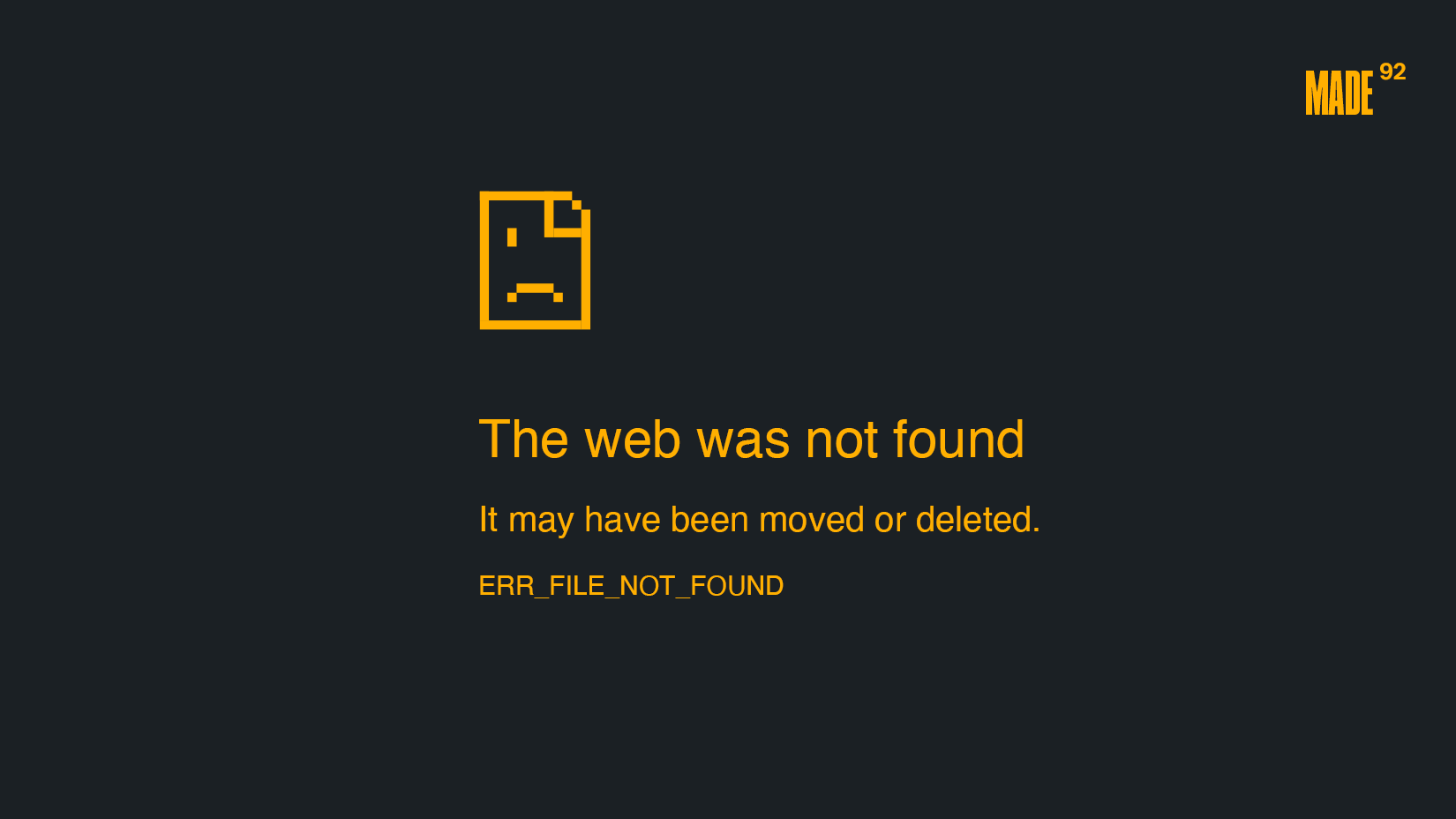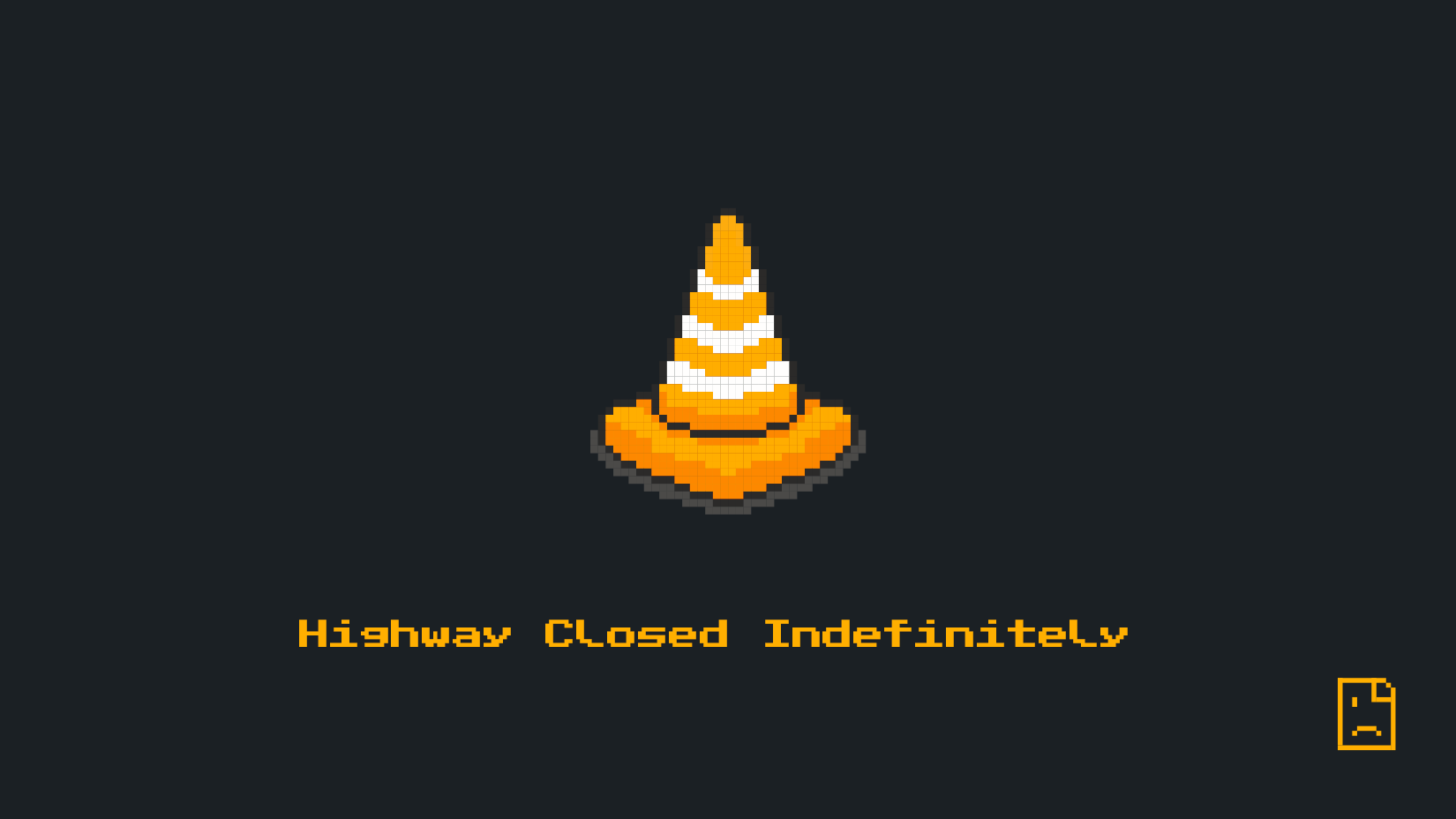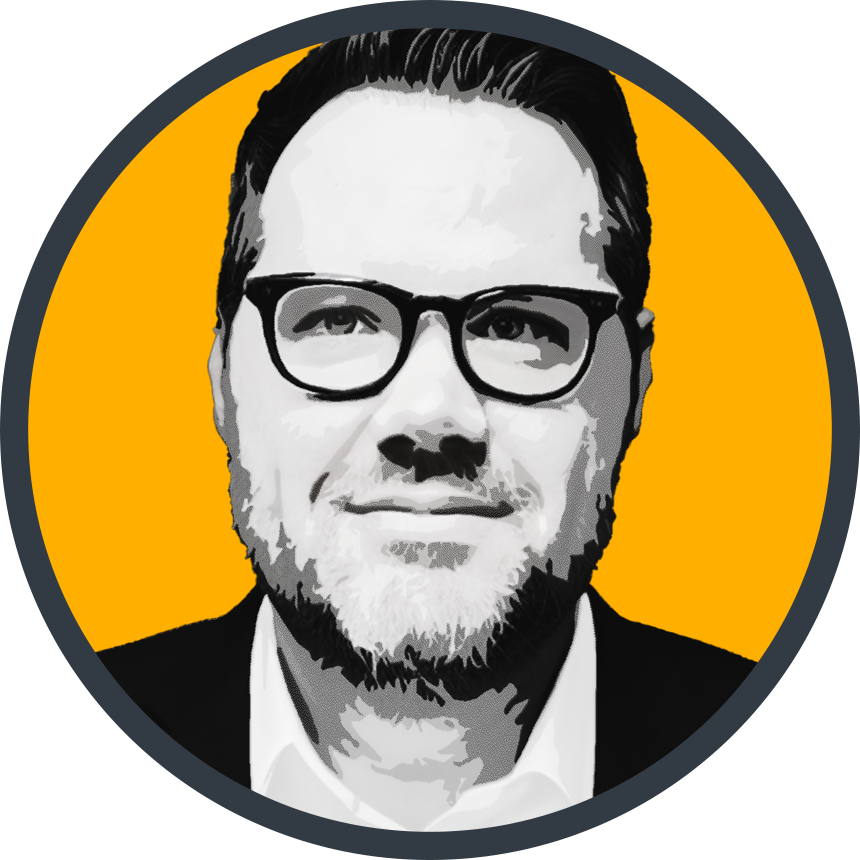The Web-ending whimper

The four foundational promises of the web broken in the last six months, and what happens next.
Doing business on the Internet used to be fun… and profitable. But in the last six months, the Internet's four foundational promises have been permanently broken. Now, ventures like yours have to pivot to a very different future.
This is the way the world ends
Not with a bang but a whimper.
- T.S. Elliot, The Hollow Men
Want to listen rather than read? Get the full article in audio below. (with a few bonuses comments and me tripping over my words at least once. NPR this is not.)
If your organization writes blogs, uses social media, buys paid ads, SEOs, leverages media, or generally uses the Internet in any way to grow your business, we need to have a chat.
Below, I will point you to four seemingly disconnected recent events that tie together a forecast of the future of growth that I’ve been warning about for some time. To do this critical topic justice, I cover a lot of ground, but my commitment to you is to hold nothing back just I can say "this is short." My ultimate standard with everything I borrow space in your inbox with is "This is really good."
So here’s the TL;DR —
Head Dominoes
- COVID masked the last gasps of an internet economy that was already dying in the wake of the 2016 election, the Facebook meltdown, Apple privacy, and the slow degradation of third-party cookies (companies tracking you across the internet). We all bought, sold, and lived in the digital landscape through various quarantines. And then we didn’t have to live online anymore. And things started to aggressively change.
- Rising interest rates and the mass contraction of Silicon Valley capital completely changed the incentive system of the internet’s cash machines, forcing the hands of mega-corps to accelerate their most extractive practices and make money faster.
The Four Promises
Four promises undergird the web’s giant role in human culture and commerce. In the last twenty years, those promises have invited trillions of dollars of economic activity to the digital world. Without those promises, the web ceases to exist as we know it. These promises have been cracking under pressure for years. But this year, four key events declared them respectively dead.
Promise #1: Early Adopters Win
Final Breakage: Podcasting Goes Bust, Winter 2023
Promise #2: The Internet is an Information Superhighway
Final Breakage: The Failed OpenAI Coup, November 22, 2023
Promise #3: Anyone Can Monetize Attention
Final Breakage: Mr. Beast Quits YouTube, April 1, 2024
Promise #4: If You Create Value, You Get Traffic
Final Breakage: The Gemini-ification of Google, May 14, 2024
Let me say this—before we go too far—I believe the endgame of these changes will be rich with possibilities. The submerging of the human-made Internet into a sea of hallucinogenic robot feeds has all the harbingers of dystopia, but there is a light at the end of the tunnel.
The danger zone is very near-term. For bootstrapped sub $1M startups and mid-markets scrapping their way to the top – the ladder is missing most of its rungs. And more are being cut as we speak.
The Internet has been the primary mechanism for entrepreneurs to grow, capitalize, and create generational wealth. The destruction of its fundamental promises is a blow to the American Dream at a time when the proverbial Dream is painfully fragile. The megacorps, the ones who have built oligarchies to avoid U.S. and European anti-trust laws, continue to consolidate power through their massive pools of data, their venomous gatekeeping, and their one-sided affiliate programs that continue to decimate the middle market and the competitive froth of entrepreneurship.
We have crossed the proverbial Rubicon.
Ventures looking for growth advantages on the web are entering a shopping mall run by enemies. At the end of the article, I’ll preview how we guide ventures like yours into what’s next.

The Head Dominoes
The false hope of the COVID era:
Jumping off the obvious study in contrasts, the COVID era was a halcyon time for going online. It created the podcasting industry as we know it, and it gave a short-term boon to legacy tools like webinars, social media engagement, and online communities.
It also bought the walled-garden megacorps (Google, Meta, etc.) time to reinforce their anti-competitive barriers and sink large amounts of cash into AI, which eventually led to where we are now.
Everything we are discussing now would have happened faster if COVID hadn’t happened. The web-based growth formula already showed signs of wear and tear in 2019, but in 2020, the entire planet went online and extended the timeline. Much of the reason why most marketers are blind to these trends is that 2020-2022 bought them three years of excuse to double down on 2016 marketing techniques. Instead of leaning into a fast-moving pivot, most marketers are still talking to you about how to get on page one of Google, selling you social media marketing services, and propping up the panacea of launching a podcast.
Interest Rates and Silicon Valley Bank:
What can’t be said enough is that the boom of the commercial web and the “creator economy” would have been impossible without near-free money. Long-term ultra-low interest rates and a massive deployment of $100Bs of wealth created by the first-generation internet billionaires created a Silicon Valley that didn’t need to make money, could buy and decimate every threat of a competitor, and create the illusion of repeatable wealth creation.
When the Fed accelerated interest rates in a (successful?) attempt to cool inflation, it closed off the very large spigot that fed the human-made internet ocean. The failure of Silicon Valley Bank made it official that the fun times were over. The internet as a “free” place to build a business was about to end.
In the last six months, these two economy-changing shifts waterfalled into a long-gestating dissolution of the unspoken rules that made the internet. Now that those rules no longer apply, every company with a website, a newsletter, and a dream of growing their business is going to have to change course.

Early Adopters Don't Win, They Are Free Labor
Podcasting was the last free field of content creation. Every day, humans and small businesses were jumping in, making amateur content, and generating enough traction and attention to justify the output. Since the mid 2010s, audio has been the last "free" arena of creative explosion on the internet. Everything else was content created by serfs on land rented from the megacorp platforms. (👋 Hi, it's me, I'm one of the serfs. 👋)
At the start of this year, Apple quietly reset the metrics to provide a more accurate view of the number of people listening to podcasts, even the most popular ones. This followed a double-digit drop in podcast listening in December, an exclamation point on 2023’s total meltdown of the space.
Today, your podcasts and their transcripts are often free game for training someone else’s AI. Fewer people are working-from-anywhere and have curtailed their listening dramatically. Most importantly, the industry now looks like the rest of the Internet: a few giant publishing platforms, throwing millions and sometimes billions at low culture, high ROI content, closing the gates on startup creators and small businesses.
“You need a podcast” was 2021’s version of 1999’s “you need a website.” Note how much faster the attention arbitrage of podcasting fell apart than their static website predecessors. In 2006, you still needed a website. In 2023, same. In 2026, your incredibly well-crafted, high-value, first-party data-driven, website will be more important than ever.
Meanwhile, fewer and fewer and fewer businesses will benefit from the podcast format. Even now that we call videos on YouTube where people sit with microphones in front of them “podcasts.” The chance that your business needs one is 1 in 100 or less.
But the lesson here isn’t about podcasts. Each of these watershed moments broke a fundamental rule of the old internet. A rule that will never be remade. In this case:
“Early adopters are long-term winners.” That’s the promise of attention arbitrage. But in this case—and how this will continue to go—the big platforms have learned how to extract value from the early adopter's risk. In podcasting, like in the old social platforms, people make content for free, cross their fingers that attention eventually means traffic which eventually means $$$$$. But that’s simply not happening. The small First on the Beach podcasts are either closing shop, paywalling everything, or dramatically reducing production. There are fewer active podcasts now than there were two years ago. The ones winning are C-list celebrities hosting rewatch podcasts of their TV shows from the 2000s or incendiary misinformation factories designed to attract Newsmax viewers and conspiracy theorists hosted by C-list celebrities.
Being early to the party didn’t make you a winner. It made you fodder for Spotify and Amazon to extract value from and then dump so they could pay Joe Rogan and the guys from Smartless. If you adopt new tech early today, you're just one more volunteer trainer for a trillion-dollar company's next product drop.
And so the first rule of the Internet is broken: Being early is no longer an advantage.

The Internet Formally Identifies as a Mis-Information Superhighway
Without recounting every step or the fundamentals of OpenAI, we have to revisit that fateful weekend in November when the non-profit board of the ChatGPT creator attempted to jettison its wunderkind CEO, Sam Altman.
Altman won. And with him, the Internet changed forever.
OpenAI was imagined as an unbiased arbiter of AI's future. But then it turned out that large language models (the tech behind most generative AI and central to most of OpenAI’s experiments) were really expensive. So they needed lots of money. Enter Microsoft and its for-profit model. Altman wanted the money and the scale at any cost, Chief Scientist Ilya Sutskever (who resigned this week) and the Board wanted to ensure the world didn't burn.
Now OpenAI needs to make money to prove its LLM (see the Silicon Valley problem above) and is no longer interested in the best kind of AI. It’s interested in making LLMs profitable so they can make more LLMs.
The problem is LLMs are a very particular kind of technology. They are incapable of logic, facts, or complex thinking and once they're hallucinating false data (a common occurrence) they are very difficult to fix.
LLMs are now what we mean when we say “AI.” But LLMs don’t have any inate intelligence, and they can’t. What looks like intelligence is ultra high-speed data analysis and mimicry. They can’t fact-check their work. They can only make you feel informed. In the next five years, the entire internet will be a patchwork of LLM-created content.
As this happens, another rule of the internet (bent terribly over the last 10 years) finally breaks: “The Internet is an information superhighway.”
With more than 47% of the Internet driven by bots, when you go online you are more likely to find a digital copy of a copy of a copy than something someone thought about.
And so what you produce on the internet is now a peer to its performative clones. Your website is competing with bot-created websites. Your ads compete with bot-created ads designed to game the bot-created algorithm to trigger a buying signal from bot-created content readers.
We spent three decades overcoming the fear that the internet was full of fake information and lies. And it took one year of LLM dominance to permanently undo it.

The Lie of the Creator Economy, Revealed
The Internet's last ten years have depended on the promise of a “Creator Economy.” While we’ve all heard the phrase, we likely haven’t considered what it means or why it matters.
A Creator Economy capitalizes on a critical promise of the 2000s and 2010s web: “Anyone can monetize attention.” Basically, if you keep showing up and creating content and grabbing eyeballs, eventually, people will give you money in sponsorships, branded deals, affiliate marketing, etc. Or, if you're old school, buy your product or service.
Nobody did this better than YouTube’s once most-prolific creator, Mr. Beast. Hundreds of millions of followers, the reigning king of hustle culture, was taking in an enormous portion of YouTube’s payments to creators.
That is, until he quit earlier this year.
We should have seen this coming. In 2023, the king of hustle culture said, “No one should be like me. I don’t have a life.” By some estimates, his ludicrous deals with YouTube cost him more money than they made him, and his wealth accumulated from spin-off businesses in energy bars and other products.
But along the way, YouTube gained hundreds of thousands of Mr. Beast wannabes. Flooding the platform (and TikTok simultaneously) with product that cost YouTube zero dollars to create.
Mr. Beast's resignation from the game, exposed the game at the highest levels. The man who described his personality as “YouTube” was central in making it what it was. He embodied YouTube and TikTok and Meta’s deceptive promise that “Anyone can monetize attention.”
Apparently even the costs of that attention are not worth the payment for one of the “Creator Economy’s” most successful citizens. While many of our readers will not identify with the drive to become a YouTube celebrity, you are spending in some case millions counting on the same promise: That attention equals money.
This promise (of the four, more a deception) has been dismantled at length by Ben Smith's book Traffic and multiple other famous former Internet prophets.
The translation from web activity to revenue has always been trickier than anyone wanted to admit. In the last five years, the once gamified maze is now a jungle of pitfalls, seemingly designed to extract value from anyone trying to make the Internet actually work for profit.

Google Finally Closes the Gate
Whole dissertations will be written about how Google extracted legendary value out of the 2000s Internet as the ultimate gatekeeper only to swing the gates shut all in the name of “Shouldn’t we give people any answers we can steal from anywhere on the Internet?” and calling it the AI revolution.
Google created a fundamental Internet rule, “If you deliver value, you will earn traffic.” This rule is the essential driving factor to most of what we know the internet to be. It created “content marketing” the “creator economy” and nearly everything your marketing team has been trained on in the name of "lead gen" and "digital marketing."
The basic premise is that the Internet’s recommendation systems (Google’s algorithm being the most famous and powerful) reward people and companies that put out content that answers people's questions. And then the magic of Google and “SEO” will send potential buyers to your site based on its relative value and rule following.
This alone created a multi-billion dollar industry called Search Engine Optimization (SEO), but SEO is more than just a marketing tactic; it has been a core element of what makes the Internet the Internet.
And it no longer applies.
At Google’s annual event last week, they announced that Gemini, their core generative AI engine, would now be the central element of their homepage. This promise frees people from the tediousness of having to click through Google’s page to other sites and get everything they need inside Google’s increasingly ironclad walls.
Gemini (Google's LLM) will produce AI-generated snippets to replace text-based web links across the top of its front page.
The irony is not lost here: Gemini depends on its ability to “learn from” content people put on the internet for free. Gemini grossly disincentivizes that creation, inspiring creators and companies to firewall their content from Google’s sweeps. Slowly Gemini gets dumber while producing more and more AI content. The noise drowns out the signal, and the once awe-inspiring foundations of the digital world are unmoored.
The ”Create Value, Get Traffic” rule is now firmly in the rearview mirror.

A Brief Map of What’s Next
If we look at the four rules, we see four basic incentives critical to economic growth, all them the Internet attempted to claim as it's own:
Promise #1: Early adopters win: the incentive to innovate
Promise #2: The Internet is an Information Superhighway: the incentive to learn
Promise #3: Anyone Can Monetize Attention: the incentive to connect
Promise #4: If You Create Value, You Get Traffic, the incentive to deliver value
These four incentives: learning, innovation, connection, and value now return to a physical world (with a digital backup) as our human brains intended. Part of why the Internet doesn't work today as promised is because its been engineered to work against the natural wiring of humans. It's built for bots.
But humans, your clients, your partners, your team members, thrive on the incentives the Internet once offered in spades, and the next wave of your growth will come from doubling down on those incentives.
Innovation: I've said for five years that "empathy is the ultimate innovation." Making lines of code scan the Internet and summarize it for us is not an exciting innovation. Companies that operationalize deep human connection and care are. We don't mean some squishy empathy that is code for "feeling bad for others." We mean a radical reshaping of go-to-market teams and CX that centers deeply on human experiences as an antidote to the digital toxins we are all inundated with.
Trust-Made Growth* Factors: Culture and Org Design
Knowledge: One of the first questions I ask leadership teams in our work with them is, "what do you know that no one else knows?" I've written at length about the critical role that intellectual property plays in the future of growth. Internal wisdom and a driving view of the future that transforms client outcomes are required. What once made the web so tantalizing was the access to knowledge. Now, it's access to noise that only accelerates your clients' demand for a differentiated perspective. Leading firms and organizations will learn to package knowledge and ladder it, drawing people into communities of shared understanding and personal growth.
Trust-Made Growth* Factor: Point-of-View
Connection: We cannot build a better world populated by better institutions, companies, and organizations by training humans to connect with robots. The neural framework of the human mind is uniquely human-attracted. (with a special place for our furry friends).
Leading firms will be centers of community, places that make connections between partners, clients, and physical neighbors. Geographic alliances will come back in fashion. The hunger for a sense of place with people who identify in that place is at an all-time high. Your firm needs to answer the question, "Who are we here, now?" not the digitized "Who are we anywhere and with no constraints?"
Trust-Made Growth* Factors: Community and Positioning
Value: In a world of AI sludge and companies like Adobe assuming every person wants to be an ad agency, delivering VALUE that is clear, accessible, and actionable has never been more special. Exceptional firms and organizations will create clear value ladders of service design, moving from free, high-value introductions through high-dollar custom engagements. Your taxonomies of what you get and how distinguished and easily navigated are the next eras killer app.
Clear is kind. As the digital world becomes more grey and more obfuscated, you stand out by designing services and engagement models that self-market. Marketing as a standalone function is chronically tainted with web-based gamesmanship, and many career marketers can't extract themselves from tactics stuck in 2018. But the heart of marketing (using the creative arts to create markets of opportunity and growth) has never been more valuable. The difference is, it is now an embedded competency in product, in org dev, in strategic planning, in CX, and even in operations.
Creating value and delivering it creatively is how the game will be won in the next five years.
Trust-Made Growth Factor: Value Creation

Our Trust-Made Growth Check was built to help you navigate these factors. Schedule a brief call with me to find out how you can get on the path to Trust-Made Growth in the post-web world.


